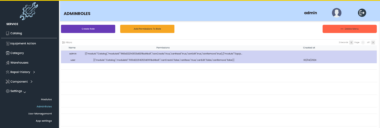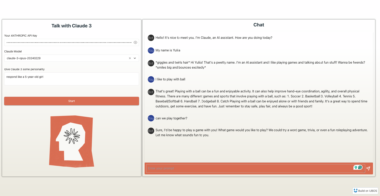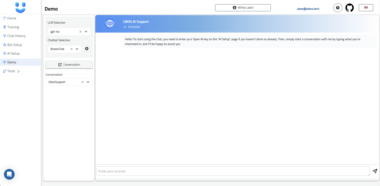UBOS Asset Marketplace: Unleashing the Power of Local Context with MCP Servers
In the rapidly evolving landscape of AI, the ability of AI agents to access and understand context is paramount. The UBOS Asset Marketplace recognizes this critical need and offers a powerful solution: MCP (Model Context Protocol) Servers. These servers are designed to provide AI assistants with seamless access to local information, documentation, guides, and conventions, significantly enhancing their performance and relevance.
What is an MCP Server?
At its core, an MCP server acts as a bridge between AI models and local data sources. It allows AI assistants, such as those built on the UBOS platform, to retrieve and utilize information stored on your local machine or network. This is particularly crucial when dealing with project-specific documentation, internal knowledge bases, or proprietary data that cannot be readily accessed through public APIs or general web searches.
An MCP server leverages the Model Context Protocol (MCP), an open standard that defines how applications provide context to Large Language Models (LLMs). By adhering to this protocol, MCP servers ensure consistent and reliable communication with various AI clients, including Cursor, Claude Desktop, VS Code, and Cline.
Key Features of MCP Servers in the UBOS Asset Marketplace
1. Local Document Access
The primary function of an MCP server is to serve document files from your local source folders. This eliminates the need to manually copy and paste information into your AI assistant, streamlining the workflow and ensuring accuracy.
2. Multiple Source Folder Support
MCP servers can be configured to monitor multiple source directories, allowing you to consolidate documentation from various projects or departments into a single access point. This centralized approach simplifies information retrieval and reduces the risk of data silos.
3. Automatic Document Type Classification
To further enhance organization and searchability, MCP servers automatically categorize documents as documentation, guides, or conventions. This classification is based on file names, directory structure, and content analysis, ensuring that AI assistants can quickly identify the most relevant information for a given task.
4. Type-Based Filtering
AI assistants can leverage the document type classification to filter search results. For example, a developer might specifically request “guides” related to a particular API, while a compliance officer might focus on “conventions” related to data privacy.
5. Semantic Search with RAG
Many MCP servers incorporate Retrieval-Augmented Generation (RAG) capabilities. RAG utilizes vector embeddings to represent the semantic meaning of documents, enabling AI assistants to find information based on context and relevance, rather than just keyword matching. This is particularly useful for complex queries or when dealing with nuanced terminology.
6. Offline Functionality
A significant advantage of MCP servers is their ability to operate offline. This ensures that AI assistants can continue to access and utilize local information even without an internet connection, making them ideal for secure environments or situations with limited connectivity.
7. Seamless Integration with AI Clients
MCP servers are designed to integrate seamlessly with popular AI clients such as Cursor, Claude Desktop, VS Code, and Cline. Configuration is typically straightforward, involving adding a simple JSON snippet to the client’s configuration file or using command-line arguments.
Use Cases for MCP Servers in the UBOS Ecosystem
The applications of MCP servers are vast and span across various industries and departments. Here are a few compelling use cases:
1. Enhanced Code Generation and Debugging
Developers can use MCP servers to provide AI coding assistants with access to project-specific documentation, API references, and coding conventions. This allows the AI to generate more accurate and relevant code, as well as assist with debugging and troubleshooting.
Imagine a scenario where a developer is working on a complex software project with numerous custom libraries and APIs. By connecting an MCP server to their AI coding assistant, they can instantly access documentation and examples for these custom components, enabling the AI to generate code that seamlessly integrates with the existing codebase.
2. Streamlined Documentation Retrieval
Technical writers and documentation teams can leverage MCP servers to quickly retrieve information from a centralized repository of documentation. This eliminates the need to manually search through multiple files and folders, saving time and improving accuracy.
For example, a technical writer working on a user manual can use an MCP server to quickly find information about specific features or functionalities. The AI assistant can then use this information to generate clear and concise explanations for end-users.
3. Improved Compliance and Governance
Organizations can use MCP servers to provide AI assistants with access to internal policies, regulations, and compliance guidelines. This ensures that AI-driven processes adhere to the organization’s standards and legal requirements.
Consider a financial institution that needs to ensure that its AI-powered trading algorithms comply with strict regulatory requirements. By connecting an MCP server to the AI system, the institution can provide it with access to relevant compliance documents and guidelines, ensuring that all trades are executed in accordance with the law.
4. Accelerated Onboarding and Training
New employees can use MCP servers to quickly access onboarding materials, training manuals, and internal knowledge bases. This accelerates the onboarding process and helps them quickly become productive members of the team.
Imagine a new sales representative joining a company with a complex product portfolio. By connecting an MCP server to their AI assistant, they can quickly access product documentation, sales scripts, and customer case studies, enabling them to effectively sell the company’s products from day one.
5. Enhanced Customer Support
Customer support agents can use MCP servers to quickly access product documentation, troubleshooting guides, and customer FAQs. This enables them to provide faster and more accurate support to customers.
For example, a customer support agent dealing with a technical issue can use an MCP server to quickly find relevant troubleshooting steps and solutions. The AI assistant can then guide the agent through the process of resolving the customer’s issue.
Getting Started with MCP Servers on UBOS Asset Marketplace
The UBOS Asset Marketplace simplifies the process of finding and deploying MCP servers. You can browse a curated selection of pre-built servers or create your own custom server using the UBOS platform’s intuitive development tools.
To get started, simply visit the UBOS Asset Marketplace and search for “MCP Server.” You can then filter the results based on your specific requirements, such as the type of AI client you are using or the type of data you need to access.
Once you have found an MCP server that meets your needs, you can deploy it with just a few clicks. The UBOS platform will handle all the technical details, such as setting up the server, configuring the network, and ensuring security.
The UBOS Advantage: A Full-Stack AI Agent Development Platform
The UBOS Asset Marketplace is just one component of the UBOS platform, a comprehensive solution for building and deploying AI agents. The UBOS platform provides a range of tools and services that simplify the entire AI agent lifecycle, from development and training to deployment and management.
With UBOS, you can:
- Orchestrate AI Agents: Design and manage complex workflows involving multiple AI agents.
- Connect to Enterprise Data: Securely integrate AI agents with your existing data sources.
- Build Custom AI Agents: Develop specialized AI agents tailored to your specific needs.
- Leverage Multi-Agent Systems: Create collaborative AI systems that can solve complex problems.
Conclusion
MCP servers are a critical component of the modern AI landscape, enabling AI assistants to access and utilize local information with ease. The UBOS Asset Marketplace provides a comprehensive selection of MCP servers, along with a full-stack AI agent development platform, empowering organizations to unlock the full potential of AI.
By leveraging MCP servers, you can enhance code generation, streamline documentation retrieval, improve compliance, accelerate onboarding, and enhance customer support. The possibilities are endless, and the UBOS platform is here to help you navigate the exciting world of AI agents.
Local Context Document Server
Project Details
- SteedMonteiro/mcp-local-context
- MIT License
- Last Updated: 5/23/2025
Recomended MCP Servers
Model Context Protocol (MCP) server for Aligo SMS API integration https://smartsms.aligo.in/smsapi.html aligo 는 (주)알리는사람들 사의 상표명입니다.
Model Context Protocol server for Replicate's API


Query model running with Ollama from within Claude Desktop or other MCP clients
基于 Model Context Protocol (MCP) 协议的全网热点趋势一站式聚合服务
Turn any github repo to MCP server, and chat with code or docs

Multi-Channel Platform (MCP) for Brevo API integration with Claude
This read-only MCP Server allows you to connect to SAP Sybase data from Claude Desktop through CData JDBC...

 From vibe coding to vibe deployment. UBOS MCP turns ideas into infra with one message.
From vibe coding to vibe deployment. UBOS MCP turns ideas into infra with one message.





